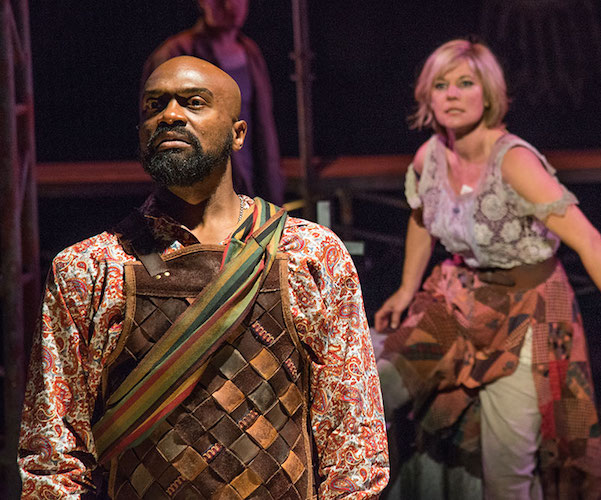Theater Review: New Rep’s Gritty “Man of La Mancha”
A fresh interpretation does wonders for this stirring production of Man of La Mancha.
Man of La Mancha. By Dale Wasserman. Music by Mitch Leigh; lyrics by Joe Darion. Directed by Antonio Ocampo-Guzman. Music direction, David Reiffel. Movement direction, Judith Chaffee. Scenic design, Eric Levenson. Costume design, Frances Nelson McSherry. Lighting design, Jeff Adelberg. New Rep Theatre at the Mosesian Center for the Arts, 321 Arsenal St., Watertown, MA., through December 31.

Maurice Emmanuel Parent (left) and Ute Gfrerer (right) in the New Rep production of “Man of La Mancha.” Photo: Andrew Brilliant / Brilliant Pictures.
By Evelyn Rosenthal
If you’ve heard the anthemic “The Impossible Dream” one too many times—sung by everyone from Frank Sinatra and the recently departed Jim Nabors (as TV’s Gomer Pyle) to Elvis and the Mighty Mighty Bosstones—you may be a bit skeptical at the prospect of a revival of Man of La Mancha, the 1965 musical that spawned it. But as with other iconic Broadway showstoppers that are often trotted out on sentimental or solemn occasions, usually swathed in strings and a swelling chorus (I’m looking at you, “You’ll Never Walk Alone” and “Climb Ev’ry Mountain”), the song’s context within the play and a fresh, compelling interpretation can make all the difference. It certainly does in the gritty, stirring production of Man of La Mancha helmed by Antonio Ocampo-Guzman.
The musical by Dale Wasserman, based on his 1959 teleplay “I, Don Quixote,” reimagines the protagonist of the first Western novel through the eyes of his creator, Miguel de Cervantes (1547–1616). The writer, actor, and tax collector has been thrown into prison to await trial, having crossed the Spanish Inquisition by taxing a monastery. To save his possessions—including precious manuscripts—from being plundered by his prisonmates, he submits to their “trial” by acting out his story of a country gentleman, Alonso Quijana, who has gone mad after too much reading while contemplating a world of murderous men, “where evil brings profit, and virtue none at all.” Quijana leaves home believing he is Don Quixote, a knight-errant who means to “right all wrongs” and restore chivalry.
The always excellent Maurice Emmanuel Parent shines in the triple role of all three men of La Mancha—Cervantes, Quijana, and Quixote. His Cervantes is sharp and playful, his Quixote passionate and earnest. As for “The Impossible Dream,” Parent rescues that declaration of idealism and courage from the saccharine; he makes it vital and urgent, eschewing long-held notes and not always going for the most beautiful tones. His understated approach to the show’s signature number reflects the overall tone of this production, which is one of its many pluses.
The rest of the fine cast also take on multiple guises as the rough prisoners who act out Cervantes’s story. Stefan Barner brings warmth and a strikingly rich voice to the role of Father Pérez. Entreated by Quijana’s scheming niece and worried housekeeper to go after the “mad” Quijana and bring him home, the priest reveals his sympathy for the old man in Barner’s tender, gorgeous rendition of “To Each His Dulcinea.” Michael Levesque adds a sweetness and wonderful comic timing to the proceedings as Sancho Panza, Cervantes’s secretary and Quixote’s “squire.” And Davron S. Monroe embodies the sour testiness of the prisoner “Duke” and the hauteur of the niece’s selfish, scholarly fiancé equally well.
The Austrian-born Ute Gfrerer, a specialist in the music of Kurt Weill, is a spirited and heartbreaking Aldonza, the kitchen wench/prostitute Don Quixote insists on seeing—and treating—as the refined “lady” he dubs Dulcinea. In the beautifully sung “It’s All the Same” and “Aldonza,” Gfrerer powerfully evokes the character’s brutal life, and the pain and confusion Quixote’s delusions cause her.
Eric Levenson’s stark set works well as both the bleak dungeon where prisoners await judgment by the all-powerful church authorities and as the “stage” for the play within the play. Ocampo-Guzman has attempted to heighten the story’s resonance by setting it in the 1960s, during the dictatorship of Francisco Franco. But not much is made of this updating; only the military costume of the guard who delivers and summons prisoners gives any hint of the director’s intention.
What does add an effective new layer in this production, though, are the musical choices made by Ocampo-Guzman and music director David Reiffel. The orchestrations of the flamenco-inflected score perfectly suit a story of rough amateurs “putting on a show,” using folk-related instruments like accordion, guitar, ukelele, flute, percussion, and bass, with only a single trumpet nodding to the music’s Broadway origins. The arrangements likewise veer off the Broadway path, toward a sparer, more rootsy sound. And having many of the actors double as musicians nicely parallels the show’s premise of prisoners doubling (and sometimes tripling) as Cervantes’s creations.
As enjoyable as New Rep’s production is, though, I couldn’t help wondering, how does this show speak to the company’s overarching theme for their 2017–18 season, “resilience”? We are meant to sympathize with the impossible dreamer who sees the world not as it is, but as it could be, as he wants it to be. But Aldonza’s claim that evil and pain can’t be ignored or wished away seems more persuasive—which is why her coming to see herself as Quixote sees her feels less than convincing. In the end, it’s not the redemption of Aldonza that points toward resilience, but the spirit and imagination of the prisoner and creator Cervantes.
Evelyn Rosenthal is a professional singer specializing in jazz and Brazilian music, a freelance editor, and the former editor in chief and head of publications at the Harvard Art Museums. She writes about musical theater, music, and books for the Arts Fuse.
Tagged: Antonio Ocampo-Guzman, Dale Wasserman, Man of La Mancha, musical
